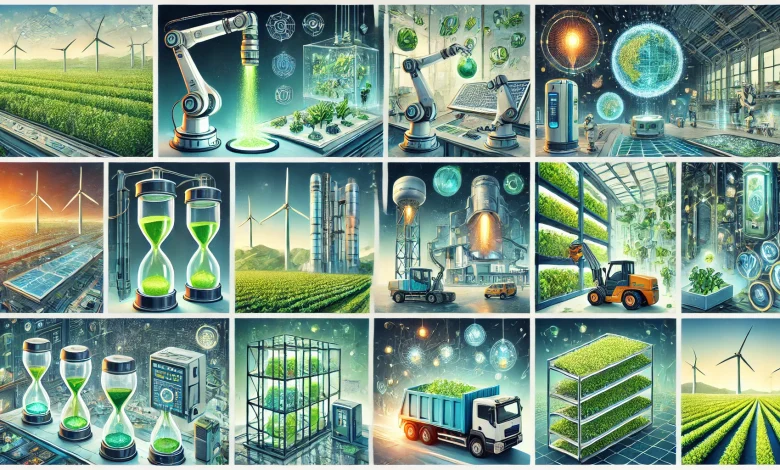Top 7 Eco-Tech Startups to Watch This Year

The world of technology is evolving rapidly, and eco-tech startups are at the forefront of the battle against environmental challenges. These companies are not just innovating; they are revolutionizing how we think about sustainability, energy efficiency, and green living. With climate change taking center stage, eco-tech startups have become crucial players in shaping a cleaner, greener future.
What Are Eco-Tech Startups?
Eco-tech startups are companies that leverage technology to address environmental issues. They innovate across various sectors, including renewable energy, sustainable agriculture, waste management, and water conservation. Their ultimate goal is to create a harmonious balance between human activity and environmental preservation.
By implementing cutting-edge technologies like artificial intelligence, Internet of Things (IoT), and blockchain, these startups aim to make sustainability scalable and accessible.
Why Watch Eco-Tech Startups?
As we confront a global climate crisis, the need for innovative solutions has never been greater. Eco-tech startups play a pivotal role by offering fresh perspectives and scalable solutions. From renewable energy breakthroughs to reducing plastic waste, these companies redefine sustainability through creativity and determination.
Below, we explore seven trailblazing eco-tech startups making a significant impact.
Redwood Materials
Redwood Materials, based in Nevada, is tackling the pressing issue of battery waste through pioneering recycling and remanufacturing efforts. Founded by JB Straubel, former Chief Technology Officer at Tesla, the company focuses on recovering valuable materials like lithium, nickel, and cobalt from discarded batteries. By creating a closed-loop system, Redwood Materials not only helps reduce the need for new mining operations but also supports the broader shift toward cleaner transportation and energy storage. This approach extends the life cycle of high-demand metals that are increasingly used in electric vehicles, consumer electronics, and renewable energy projects. With its strategic partnerships, Redwood Materials has positioned itself as a key player in building a more sustainable supply chain for batteries worldwide.
Amp Robotics
Amp Robotics is revolutionizing waste management through advanced robotics and artificial intelligence. At its core, the company leverages sophisticated image recognition and machine learning software to sort and separate recyclables with remarkable speed and accuracy. Traditional facilities rely heavily on manual sorting, a process that is not only labor-intensive but also prone to errors and safety risks. Amp Robotics addresses these challenges by automating the identification of materials such as plastics, metals, and paper, diverting large volumes of recyclable waste from landfills. This innovation reduces operational costs for recycling facilities, creates safer working conditions, and bolsters the overall efficiency of an industry that is crucial for reducing environmental harm. As demand for improved waste management grows, Amp Robotics is poised to become integral to a circular economy framework.
Climeworks
Climeworks is committed to mitigating climate change by pulling excess carbon dioxide straight out of the air. Using direct air capture technology, the company’s compact, modular machines can be situated near renewable energy sources and optimized to capture CO₂ molecules. Once captured, the gas can be sequestered underground, where it mineralizes over time, or repurposed for various industrial uses. Climeworks offers subscription-based carbon removal services, giving individuals and businesses an opportunity to effectively neutralize part of their carbon footprint. As global awareness of climate change reaches new heights, Climeworks stands out by providing a proactive way to address rising CO₂ levels, signaling that carbon removal may become a significant component of sustainable business strategies in the years to come.
Commonwealth Fusion Systems
Commonwealth Fusion Systems is fast-tracking progress toward harnessing fusion power, often regarded as the ultimate clean energy source. The company emerged from research at the Massachusetts Institute of Technology and aims to develop smaller, more efficient fusion reactors using high-temperature superconducting magnets. Fusion, which replicates the process powering the Sun, promises abundant, emissions-free electricity with significantly less radioactive waste compared to conventional nuclear fission. While the dream of fusion energy has long eluded practical realization, Commonwealth Fusion Systems has attracted considerable investment and research interest for its bold approach. If successful, fusion power could transform the global energy landscape, delivering a reliable source of electricity without the detrimental environmental impact of fossil fuels.
Plenty
Plenty is reinventing agriculture through indoor vertical farming, offering a sustainable alternative that requires considerably less water and land than conventional farming methods. This forward-thinking startup uses state-of-the-art LED technology, data analytics, and automation systems to control and optimize plant growth within stacked layers in warehouse-like settings. Because the environment is carefully regulated, crops can be grown year-round without pesticides, while ensuring consistent quality and taste. Vertical farms like those operated by Plenty can be located close to major urban centers, reducing transportation time and cutting down on spoilage. With climate-related disruptions on the rise and growing concerns about food insecurity, the model championed by Plenty provides a glimpse into how agriculture might evolve to meet the demands of an ever-expanding global population.
Rubicon
Rubicon is ushering in a new era of waste management by connecting businesses and communities with a network of independent waste haulers and recyclers. Sometimes described as an “Uber for trash,” the company’s technology platform enables users to identify more efficient collection routes, track waste streams in real time, and analyze data on recycling and disposal. With robust metrics, organizations can uncover opportunities for reducing waste, optimizing recycling programs, and cutting operational costs. By streamlining processes and providing transparency in the notoriously fragmented waste management sector, Rubicon helps businesses shrink their environmental footprint and improve their bottom line. The platform also opens the door to more sophisticated partnerships in material recovery, further bolstering sustainability goals.
Ecovative
Ecovative is breaking new ground by harnessing the power of mycelium—the root structure of mushrooms—to create biodegradable alternatives to plastics, foams, and other petroleum-based materials. The company’s process involves growing fungal threads around agricultural byproducts, such as corn stalks or sawdust, until a durable mass is formed. This material can be molded into packaging, building insulation, or even textile components. After its use, the mycelium-based product naturally decomposes into soil without leaving behind harmful microplastics. Ecovative’s approach demonstrates how nature-based design can help replace single-use materials, which have become a major source of pollution on land and in waterways. As businesses and consumers look for greener packaging and construction options, Ecovative’s biologically derived products represent a compelling path forward.
The Role of Innovation in Sustainability
These eco-tech startups exemplify the growing momentum around innovative climate solutions. Each one tackles a specific area of concern—from energy and waste to agriculture and materials—yet they share a broader mission to mitigate environmental harm and pave the way to a cleaner future. Their technologies, while diverse, are bound by a commitment to reinvent established practices and reshape public perceptions of what is possible through modern science and entrepreneurship. As investment and public support for sustainability continue to gather speed, these forward-looking companies stand poised to make an outsized impact in the coming years, bridging the gap between innovation and meaningful progress for the planet.




